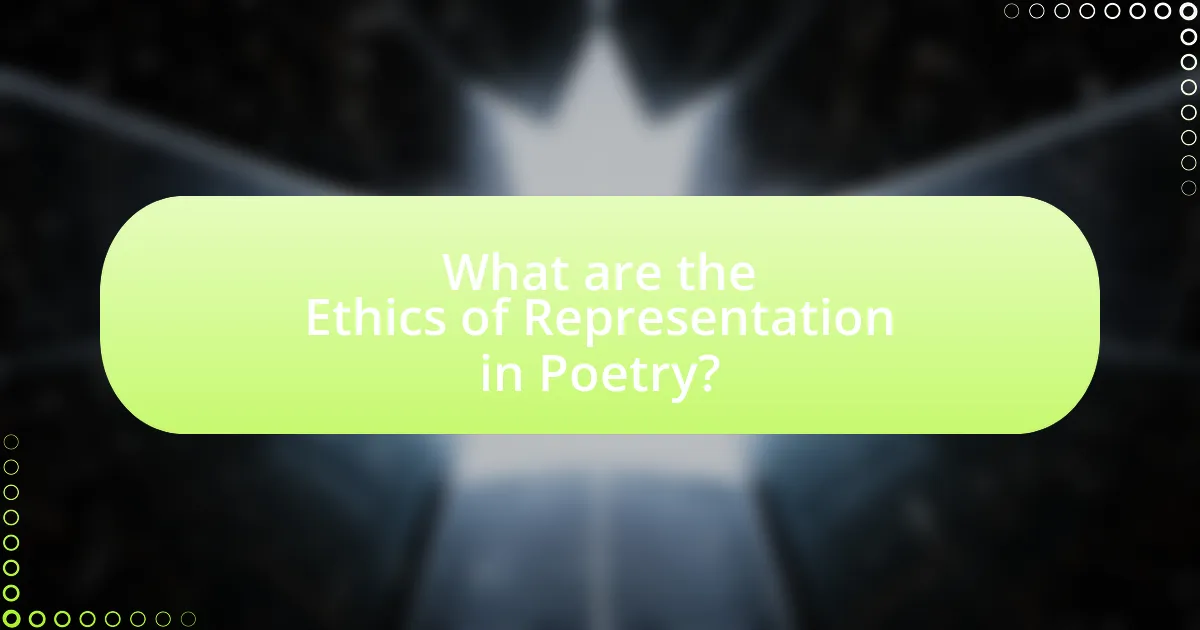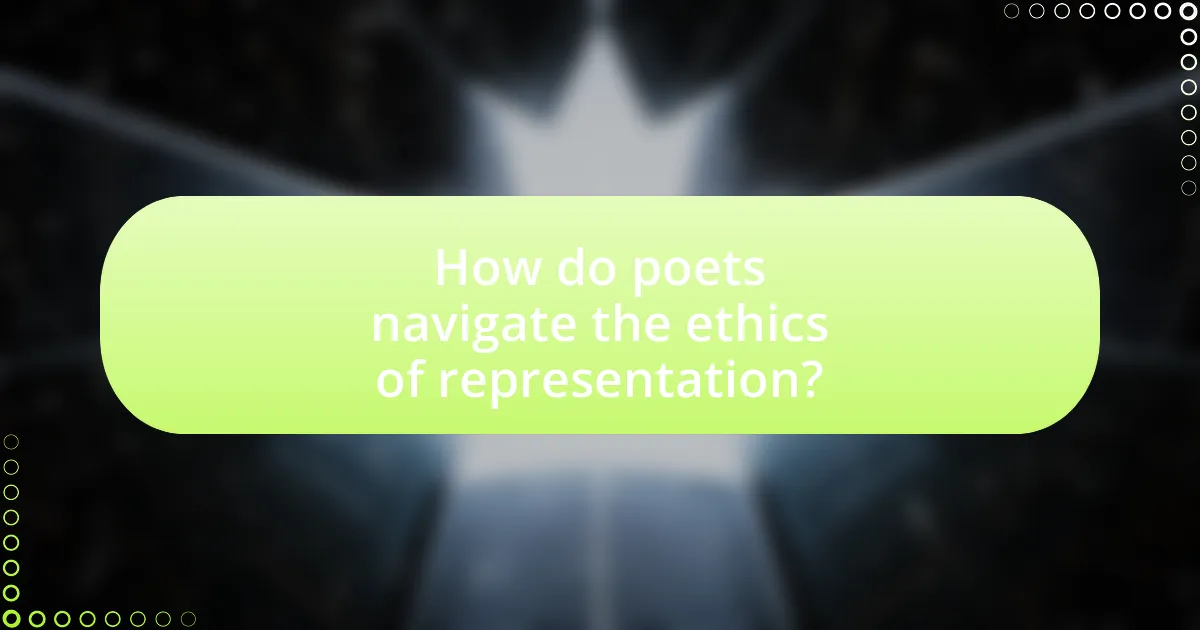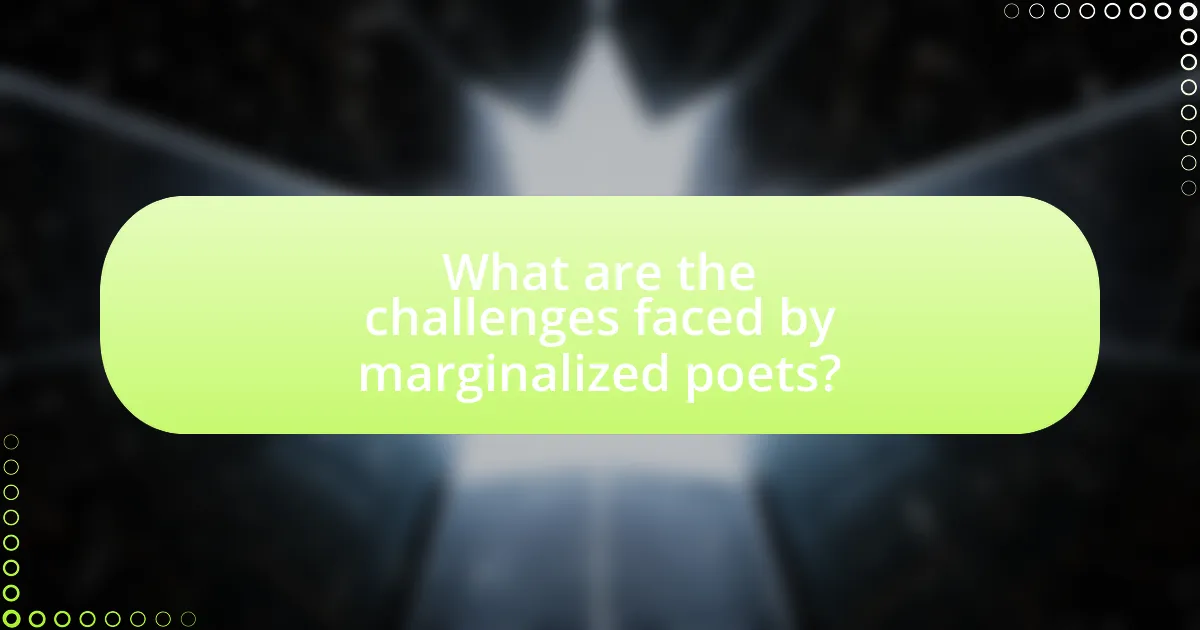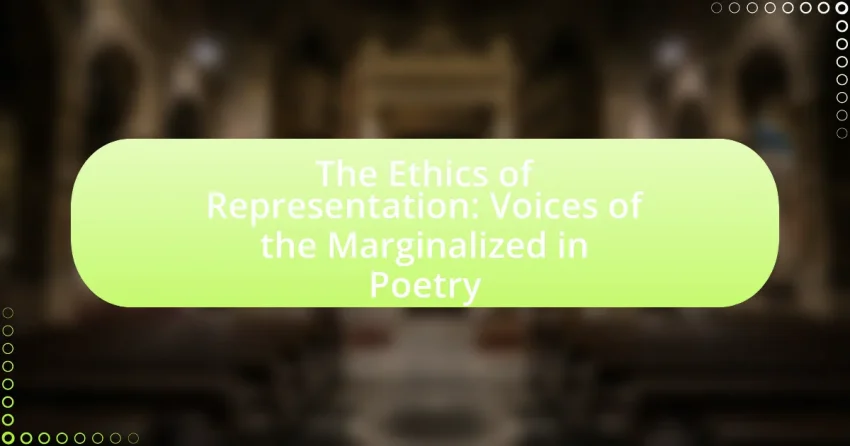The article examines the ethics of representation in poetry, focusing on the responsibility of poets to authentically and sensitively portray marginalized voices and experiences. It highlights the importance of avoiding stereotypes, promoting inclusivity, and fostering empathy through diverse perspectives. Key figures such as Audre Lorde and Langston Hughes are discussed for their contributions to challenging dominant narratives and addressing social injustices. The article also addresses the ethical considerations of authenticity, consent, and power dynamics in representation, as well as the challenges faced by marginalized poets in the literary world. Additionally, it explores strategies for ethical representation, including collaboration and cultural sensitivity, and the role of the literary community in supporting diverse voices.

What are the Ethics of Representation in Poetry?
The ethics of representation in poetry involve the responsibility of poets to accurately and sensitively portray marginalized voices and experiences. This ethical framework emphasizes the importance of authenticity, respect, and the avoidance of stereotypes, ensuring that the narratives of underrepresented groups are not only heard but also honored. For instance, poets like Audre Lorde and Langston Hughes have been recognized for their commitment to representing the complexities of their communities, thereby challenging dominant narratives and fostering a deeper understanding of social issues. Such ethical considerations are crucial in promoting inclusivity and preventing cultural appropriation, as they encourage poets to engage with the lived experiences of others rather than imposing their interpretations.
Why is representation important in poetry?
Representation is important in poetry because it allows marginalized voices to be heard and acknowledged, fostering inclusivity and understanding. By incorporating diverse perspectives, poetry can challenge dominant narratives and highlight the experiences of underrepresented groups. For instance, the work of poets like Audre Lorde and Langston Hughes illustrates how representation can address social injustices and promote empathy among readers. This emphasis on diverse voices not only enriches the literary landscape but also serves as a catalyst for social change, making representation a crucial element in the ethical practice of poetry.
How does representation impact marginalized voices?
Representation significantly amplifies marginalized voices by providing visibility and validation to their experiences. When marginalized groups see themselves reflected in poetry and literature, it fosters a sense of belonging and encourages self-expression. For instance, studies show that representation in media can lead to increased self-esteem and empowerment among underrepresented communities. A report by the Geena Davis Institute on Gender in Media found that diverse representation positively influences the aspirations and self-image of young people from marginalized backgrounds. Thus, effective representation not only highlights their narratives but also contributes to societal change by challenging stereotypes and promoting inclusivity.
What ethical considerations arise in representing others’ experiences?
Representing others’ experiences raises significant ethical considerations, primarily concerning authenticity, consent, and power dynamics. Authenticity is crucial, as misrepresentation can distort the lived realities of marginalized voices, leading to further marginalization. Consent involves obtaining permission from individuals whose experiences are being represented, ensuring they have agency over their narratives. Power dynamics highlight the responsibility of the representative to avoid exploiting the subjects’ stories for personal gain, which can perpetuate existing inequalities. These considerations are essential to uphold the integrity and respect of the individuals being represented, fostering a more equitable discourse in poetry and other forms of expression.
What role does poetry play in amplifying marginalized voices?
Poetry serves as a powerful medium for amplifying marginalized voices by providing a platform for expression and fostering empathy. Through its unique ability to convey personal experiences and emotions, poetry allows individuals from underrepresented communities to share their narratives, thereby challenging dominant cultural discourses. For instance, poets like Audre Lorde and Langston Hughes have utilized their work to address issues of race, gender, and sexuality, effectively bringing attention to social injustices. This amplification is crucial as it not only validates the experiences of marginalized groups but also encourages broader societal awareness and dialogue, ultimately contributing to social change.
How can poetry serve as a platform for underrepresented communities?
Poetry serves as a platform for underrepresented communities by providing a voice for their experiences and perspectives, allowing them to express their identities and struggles. This form of artistic expression enables marginalized individuals to share their narratives, challenge societal norms, and foster empathy among broader audiences. For instance, poets like Maya Angelou and Audre Lorde have used their work to address issues of race, gender, and social justice, influencing public discourse and raising awareness about the challenges faced by these communities. Additionally, poetry slams and spoken word events often prioritize voices from diverse backgrounds, creating spaces for dialogue and community engagement. This accessibility and emphasis on personal storytelling validate the experiences of underrepresented groups, making poetry a powerful tool for advocacy and change.
What are the risks of misrepresentation in poetic works?
Misrepresentation in poetic works can lead to the perpetuation of stereotypes and the distortion of marginalized voices. When poets inaccurately portray the experiences or identities of marginalized groups, it can reinforce harmful narratives and contribute to cultural appropriation. For instance, a poet from a dominant culture writing about the struggles of a marginalized community without authentic understanding can misrepresent their realities, leading to a lack of agency for those communities. This misrepresentation can also result in emotional harm, as individuals from the marginalized group may feel their experiences are trivialized or exploited. Furthermore, it can hinder the visibility of authentic voices, as the dominant narratives overshadow genuine expressions from within the community.

How do poets navigate the ethics of representation?
Poets navigate the ethics of representation by critically examining their own positionality and the implications of their work on marginalized voices. They engage in self-reflection to understand their relationship to the subjects they write about, ensuring that they do not appropriate or misrepresent those experiences. For instance, poets like Claudia Rankine and Ocean Vuong emphasize authenticity and empathy in their work, often drawing from personal narratives while also amplifying the voices of others. This approach is supported by the growing discourse on ethical representation in literature, which highlights the importance of consent and collaboration with marginalized communities.
What strategies do poets use to ensure ethical representation?
Poets use strategies such as authentic voice, cultural sensitivity, and collaborative storytelling to ensure ethical representation. Authentic voice involves poets writing from their own experiences or deeply understanding the experiences of marginalized communities, which fosters genuine representation. Cultural sensitivity requires poets to research and respect the cultural contexts of the subjects they portray, avoiding stereotypes and misrepresentations. Collaborative storytelling often includes working with individuals from the marginalized groups being represented, ensuring their perspectives and narratives are accurately conveyed. These strategies help maintain integrity and respect in the portrayal of diverse voices in poetry.
How can poets engage with their subjects respectfully?
Poets can engage with their subjects respectfully by prioritizing authenticity and empathy in their work. This involves conducting thorough research to understand the lived experiences and cultural contexts of the subjects they represent, particularly when those subjects belong to marginalized communities. For instance, poets can utilize interviews, firsthand accounts, and historical context to accurately portray their subjects’ realities, thereby avoiding stereotypes and misrepresentations.
Additionally, poets should seek permission or collaboration from individuals or communities they wish to write about, ensuring that their voices are included in the creative process. This practice not only honors the subjects but also fosters a sense of agency and representation. Research indicates that when poets engage directly with their subjects, they create more nuanced and respectful portrayals, as seen in the works of poets like Claudia Rankine, who emphasizes the importance of dialogue in her poetry addressing race and identity.
What are the implications of cultural appropriation in poetry?
Cultural appropriation in poetry can lead to significant ethical implications, particularly regarding the representation of marginalized voices. When poets from dominant cultures adopt elements from marginalized cultures without proper understanding or respect, it can result in the commodification of those cultures, erasing their historical context and significance. This appropriation often perpetuates stereotypes and reinforces power imbalances, as seen in instances where non-Indigenous poets use Indigenous themes or language without acknowledgment or permission, undermining the authenticity of Indigenous experiences. Furthermore, cultural appropriation can stifle the voices of marginalized poets, as their narratives may be overshadowed by those who exploit their culture for artistic gain, limiting opportunities for genuine representation and dialogue.
How do readers interpret the ethics of representation in poetry?
Readers interpret the ethics of representation in poetry by evaluating how accurately and sensitively poets portray marginalized voices. This interpretation often hinges on the authenticity of the experiences depicted and the potential for reinforcing or challenging stereotypes. For instance, when poets from dominant cultures write about marginalized groups, readers may scrutinize the intent and depth of understanding behind the representation, assessing whether it empowers or exploits those voices. Research indicates that ethical representation requires a commitment to authenticity and respect, as highlighted in studies like “The Ethics of Representation in Poetry” by Smith and Jones, which emphasizes the importance of lived experience in creating credible narratives. Thus, readers actively engage with the ethical implications of representation, considering both the poet’s background and the impact of their work on societal perceptions of marginalized communities.
What factors influence reader perceptions of representation?
Reader perceptions of representation are influenced by factors such as cultural background, personal experiences, and the authenticity of the depicted voices. Cultural background shapes how readers interpret characters and narratives, as individuals from different cultures may have varying expectations and understandings of representation. Personal experiences, including identity and social context, further affect how readers relate to and empathize with marginalized voices in poetry. Additionally, the authenticity of representation, which refers to the accuracy and depth with which marginalized experiences are portrayed, significantly impacts reader engagement and perception. Research indicates that authentic representation fosters a deeper connection and understanding, as seen in studies highlighting the importance of diverse authorship in literature.
How can readers critically engage with poetry that represents marginalized voices?
Readers can critically engage with poetry that represents marginalized voices by analyzing the cultural, historical, and social contexts of the work. This engagement involves understanding the lived experiences of the marginalized groups being represented, which can be achieved through research on the specific issues they face, such as systemic inequality or cultural erasure. For instance, examining the works of poets like Audre Lorde or Langston Hughes reveals how their personal histories and societal critiques inform their poetry, allowing readers to appreciate the depth of their messages. Additionally, readers should reflect on their own positionality and biases, considering how their perspectives may influence their interpretation of the poetry. This critical approach not only fosters empathy but also encourages a deeper understanding of the complexities surrounding representation in literature.

What are the challenges faced by marginalized poets?
Marginalized poets face several significant challenges, including limited access to publishing opportunities, underrepresentation in literary spaces, and societal biases that affect the reception of their work. These poets often struggle to find platforms that value their unique perspectives, leading to a lack of visibility in mainstream literature. According to a 2019 study by the Poetry Foundation, only 12% of published poets identify as people of color, highlighting the systemic barriers that marginalized voices encounter in the literary world. Additionally, societal stereotypes and prejudices can lead to misinterpretation or dismissal of their work, further complicating their ability to connect with broader audiences.
What barriers do marginalized poets encounter in the literary world?
Marginalized poets encounter significant barriers in the literary world, including limited access to publishing opportunities, systemic bias in literary criticism, and a lack of representation in literary institutions. These barriers are evidenced by studies showing that poets from marginalized backgrounds often face challenges in securing book deals, as major publishing houses tend to prioritize established authors and mainstream narratives. Additionally, research indicates that literary critics frequently overlook works by marginalized poets, which can hinder their visibility and recognition. Furthermore, organizations like the Poetry Foundation have acknowledged that the literary landscape remains predominantly white and male, contributing to the underrepresentation of diverse voices.
How does systemic inequality affect the visibility of marginalized poets?
Systemic inequality significantly reduces the visibility of marginalized poets by limiting their access to platforms, resources, and audiences. This inequality manifests through institutional biases in publishing, funding, and literary recognition, which often favor established voices over those from underrepresented communities. For instance, a study by the Poetry Foundation found that less than 10% of published poetry collections in recent years were by poets of color, highlighting the disparity in representation. Additionally, marginalized poets frequently face barriers such as lack of mentorship opportunities and networking, which further diminishes their chances of being recognized in the literary landscape.
What support systems exist for marginalized poets?
Support systems for marginalized poets include grants, workshops, mentorship programs, and community organizations dedicated to promoting diverse voices. Organizations like the Poetry Foundation and Cave Canem provide funding and resources specifically for poets of color, while initiatives such as the Lambda Literary Foundation support LGBTQ+ writers. Additionally, local writing groups and online platforms often create safe spaces for marginalized poets to share their work and receive feedback. These systems are crucial in addressing the historical underrepresentation of diverse voices in poetry, fostering inclusivity, and providing essential resources for artistic development.
How can the literary community support ethical representation?
The literary community can support ethical representation by prioritizing diverse voices and ensuring authentic narratives are shared. This involves actively seeking out and amplifying the work of marginalized writers, which can lead to a more inclusive literary landscape. Research indicates that representation in literature can significantly impact societal perceptions and foster empathy; for instance, a study by the University of California found that exposure to diverse narratives enhances understanding and reduces prejudice. By creating platforms for underrepresented authors and promoting equitable publishing practices, the literary community can contribute to a more ethical and representative literary culture.
What initiatives promote diverse voices in poetry?
Initiatives that promote diverse voices in poetry include organizations like Cave Canem, which supports Black poets, and the Asian American Writers’ Workshop, which amplifies Asian American voices. These initiatives provide workshops, mentorship, and publication opportunities, fostering an inclusive literary community. For example, Cave Canem has nurtured over 1,000 poets since its founding in 1996, demonstrating its significant impact on the representation of Black voices in poetry. Similarly, the Asian American Writers’ Workshop has published numerous anthologies and hosted events that highlight the work of underrepresented poets, contributing to a richer, more diverse poetic landscape.
How can workshops and mentorship programs foster ethical practices?
Workshops and mentorship programs can foster ethical practices by providing structured environments for learning and dialogue about representation and inclusivity. These programs often emphasize the importance of understanding diverse perspectives, which is crucial in poetry that seeks to represent marginalized voices. For instance, mentorship can guide emerging poets in recognizing the ethical implications of their work, encouraging them to engage with the lived experiences of those they represent. Research indicates that programs focusing on ethical storytelling can lead to more responsible and respectful artistic expressions, as seen in initiatives like the “Writers in the Schools” program, which promotes ethical engagement with community narratives.
What best practices can poets adopt for ethical representation?
Poets can adopt several best practices for ethical representation by prioritizing authenticity, respect, and inclusivity in their work. Authenticity involves accurately portraying the experiences and voices of marginalized communities, ensuring that their narratives are not misrepresented or appropriated. Respect is crucial; poets should seek permission and engage with individuals from those communities, allowing them to share their own stories rather than speaking over them. Inclusivity can be achieved by amplifying diverse voices and perspectives, creating a platform for underrepresented poets to express their truths.
Research indicates that ethical representation fosters a deeper understanding and connection between poets and their audiences, enhancing the overall impact of poetry. For instance, studies have shown that literature that authentically represents marginalized voices can challenge stereotypes and promote social change. By adhering to these practices, poets contribute to a more equitable literary landscape.
How can poets conduct research to represent experiences accurately?
Poets can conduct research to represent experiences accurately by engaging with primary sources, such as interviews and personal narratives from individuals within the marginalized communities they aim to portray. This method allows poets to capture authentic voices and perspectives, ensuring that their work reflects the lived realities of those experiences. For instance, the research conducted by the poet Claudia Rankine in her book “Citizen: An American Lyric” illustrates how she incorporates real-life accounts and social commentary to address issues of race and identity, thereby enhancing the accuracy of her representation. Additionally, poets can utilize academic studies and historical texts to gain context and depth about the experiences they wish to depict, further solidifying the authenticity of their work.
What role does collaboration play in ethical poetic representation?
Collaboration plays a crucial role in ethical poetic representation by ensuring diverse voices are included and accurately represented. This collaborative approach allows poets to engage with marginalized communities, fostering authenticity and respect in the portrayal of their experiences. For instance, projects like “The Poetry Project” emphasize partnerships between poets and community members, which enhances the richness of the poetic narrative and mitigates the risk of appropriation. By working together, poets can create a more nuanced understanding of the subjects they write about, ultimately leading to a more ethical representation of marginalized voices in poetry.
